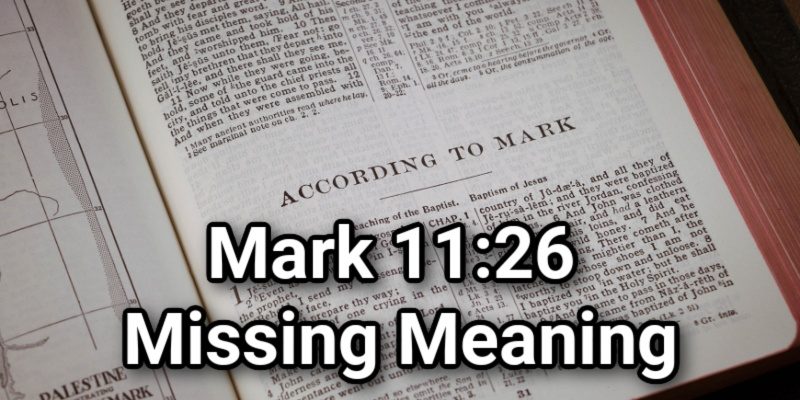Lord’s Library editors offer a Mark 11:26 meaning with commentary on why the verse is missing from new Bible versions, for your edification.
 When trying to understand the meaning of Mark 11:26 and see why it’s missing in modern versions, first see the verse: “But if ye do not forgive, neither will your Father which is in heaven forgive your trespasses.”
When trying to understand the meaning of Mark 11:26 and see why it’s missing in modern versions, first see the verse: “But if ye do not forgive, neither will your Father which is in heaven forgive your trespasses.”
Mark 11:26 says, “But if ye do not forgive, neither will your Father which is in heaven forgive your trespasses.” In the King James Bible, this verse stands as a direct and sobering conclusion to Jesus’ teaching on the power of prayer and the necessity of forgiveness. It follows verse 25, where Jesus commands believers to forgive when they stand praying. Verse 26 reinforces the point with eternal consequences: if you refuse to forgive others, God will not forgive you. Yet, this critical verse is entirely missing from most modern Bible versions, including the ESV, NIV, and NASB. Just like with other key omissions, you’ll find a footnote instead, saying that “some manuscripts” include it. What they don’t say is that the majority of manuscripts include it—and that the removal of this verse follows a clear pattern of doctrinally potent Scripture being erased under the guise of textual purity.
Mark 11:26 Missing Meaning
This verse is not optional. It is not a stray repetition or a scribal gloss. It is a core teaching of Jesus Christ—an unambiguous statement tying the vertical relationship with God to the horizontal relationship with others. Without Mark 11:26, the passage ends weakly, leaving only the encouragement to forgive in verse 25 without any teeth behind it. But with verse 26 included, the urgency becomes clear: refusing to forgive puts your own forgiveness at stake. This isn’t about works-based salvation—it’s about the heart posture of one who has truly received grace. A saved man who understands what he’s been forgiven of will extend that forgiveness to others. Jesus reinforces this principle throughout the Gospels, most notably in the parable of the unforgiving servant in Matthew 18. The doctrine is biblical, necessary, and entirely consistent. So why remove it?
Once again, the justification rests on the claim that Mark 11:26 is not found in a small number of early Alexandrian manuscripts, especially Codex Vaticanus and Codex Sinaiticus—the twin pillars of modern textual criticism. But these two codices disagree with each other and with the vast majority of manuscript evidence on thousands of points. They are not reliable, and they were not used or trusted by the believing Church for centuries. The King James Bible, based on the Textus Receptus and supported by the Byzantine manuscript tradition, retains Mark 11:26 because the overwhelming majority of Greek manuscripts include it. The verse didn’t magically appear—it was preserved.
The removal of this verse once again exposes the flawed philosophy of modern Bible translation: an overdependence on a narrow slice of the manuscript record, a preference for what is rare over what is preserved, and an increasing tendency to delete hard truths in favor of smoother texts. It’s not just what’s missing from these Bibles—it’s what’s being lost in the soul of the Church. Without verses like Mark 11:26, the fear of God weakens. The moral seriousness of discipleship is dulled. The Gospel becomes a matter of comfort rather than transformation. And the words of Christ—piercing, precise, and powerful—are softened into vague suggestions.
Mark 11:26 belongs in the Bible. It belongs in the passage. It belongs in the hearts of believers who take the words of Jesus seriously. The King James Bible preserves it because it was never meant to be erased. It’s not up for debate. It’s not a footnote. It’s a line drawn in eternal ink: if you will not forgive, your Father will not forgive you. That’s not legalism—it’s Lordship. And if your Bible leaves that out, maybe it’s time to ask what else it’s willing to silence. Stick with the Book that refuses to cut Christ off mid-sentence. Stick with the Bible that warns, convicts, and sanctifies. Stick with the King James.
Lord's Library is a Christian resource hub. Our editors use a variety of internet research methods like search engines, audio and video, AI, consultations with ministry leaders in the field, and more. Lord's Library should never be a substitute for reading your Bible daily as the Scriptures are to be our final authority on all matters. Lord's Library participates in affiliate programs. We may make a small commission from products purchased through this resource.
- Mark 7:16 Meaning: Why is it Missing in Modern Bibles? - June 5, 2025
- What Does the Bible Say about Habits? With Key Scriptures - May 25, 2025
- What Does the Bible Say about Grief? With Key Scriptures - May 24, 2025















